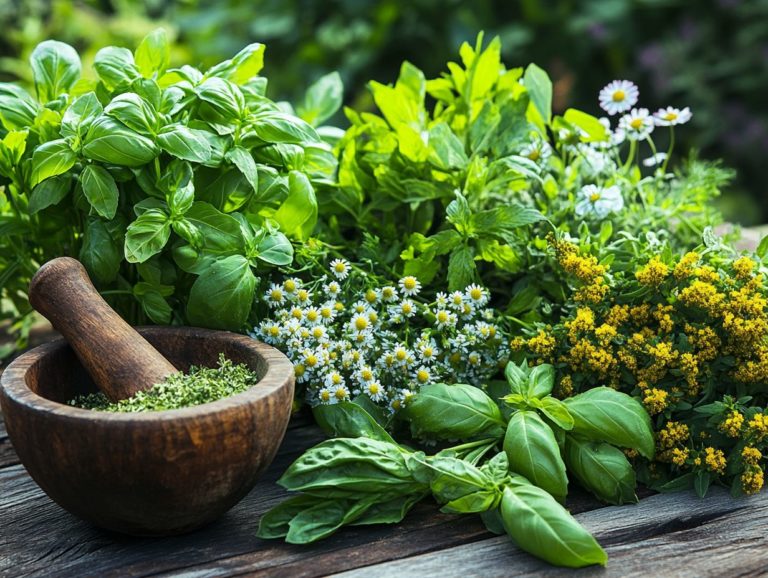What Are the Most Common Herbal Remedies?
Herbal remedies have become increasingly popular as natural alternatives for promoting your health and well-being. With more people turning to natural solutions than ever before, herbal remedies are revolutionizing our approach to health!
Rooted in centuries of tradition, these remedies provide a holistic approach to healing. They effectively address a variety of common conditions using plants and herbs.
This guide delves into the numerous benefits of herbal treatments, including herbal supplements and the types of herbs and supplements available. It also highlights essential considerations regarding their use.
Additionally, it outlines potential risks and offers insights on how to safely incorporate these remedies into your wellness routine.
Whether you re just beginning your journey with herbal medicine or seeking to deepen your understanding, you ll discover valuable insights that can transform your health!
Contents
- Key Takeaways:
- Benefits of Using Herbal Remedies
- Types of Herbal Remedies
- Potential Risks and Side Effects
- Tips for Choosing and Using Herbal Remedies
- Frequently Asked Questions
- What Are the Most Common Herbal Remedies?
- What is Echinacea and How Does It Help with Health?
- Why is Garlic Considered a Powerful Herbal Remedy?
- What Benefits Does Ginger Provide to the Body?
- How Does Ginseng Help Improve Overall Health?
- What Makes Peppermint a Popular Herbal Remedy?
- Why is Turmeric Considered a Superfood?
Key Takeaways:
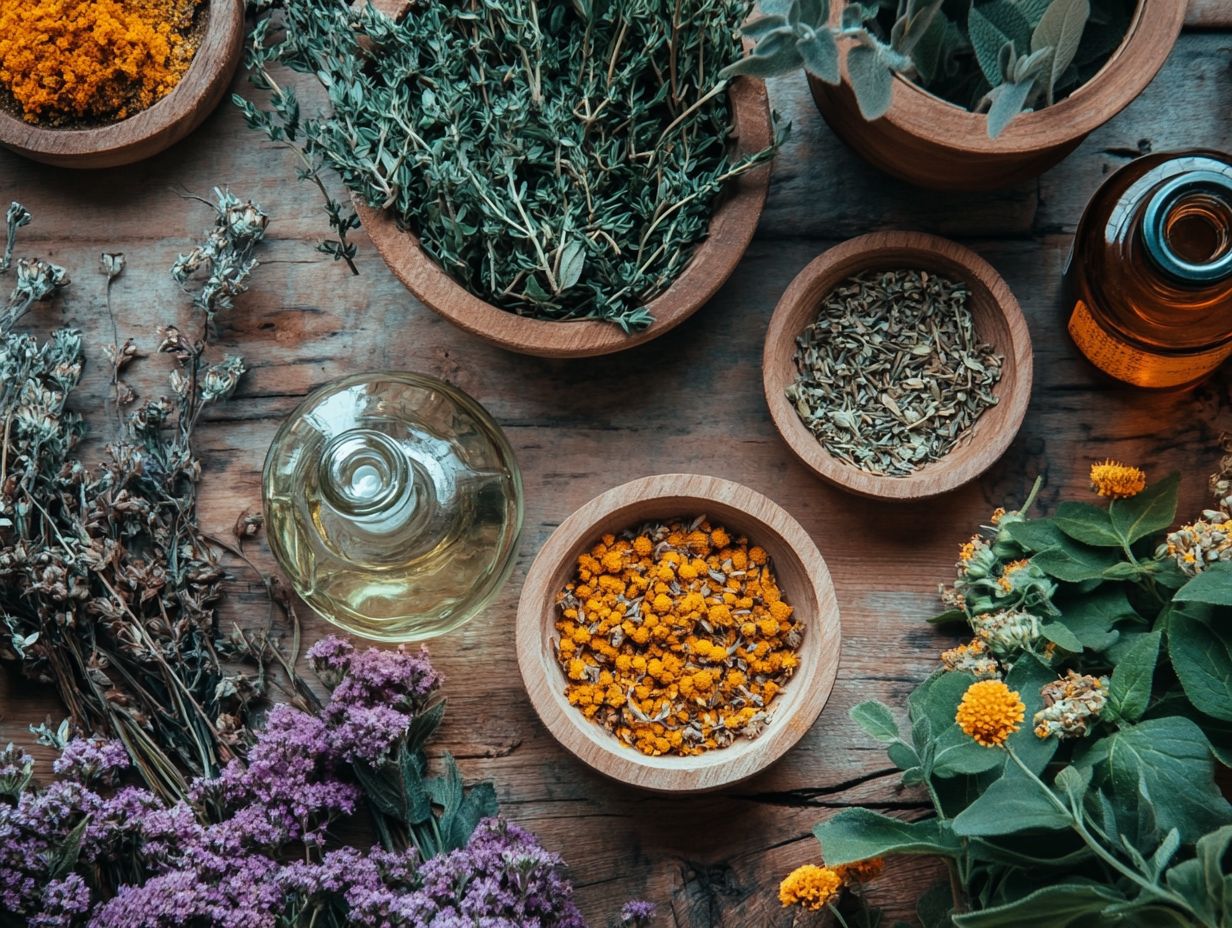
- Herbal remedies offer a natural and holistic approach to healing, using herbs and plants for medicinal purposes.
- Common conditions treated with herbal remedies include digestive issues, anxiety, and inflammation.
- Always research and consult with a healthcare provider to ensure proper use and avoid risks.
What are Herbal Remedies?
Herbal remedies are natural solutions drawn from medicinal herbs and plant-based products that have a long-standing history of treating ailments and promoting health. These remedies, integral to traditional herbal medicine, come in various forms such as dried herbs, concentrated liquid extracts, brewed teas, and skin gels.
Their effectiveness lies in the unique medicinal properties of the plants used, which can offer health benefits for a range of health conditions.
The rich legacy of herbal remedies dates back to ancient civilizations, where they were essential to overall health practices. Many individuals seek out these alternatives for their potential advantages, particularly the reduced side effects when compared to conventional pharmaceuticals.
It s crucial to consult with healthcare providers before incorporating herbal remedies into your health routine. This is especially important when considering interactions with prescription medicines and over-the-counter medicines.
Consulting healthcare providers helps ensure safe and effective use, taking into account potential interactions with prescribed medications and your individual health needs.
Benefits of Using Herbal Remedies
Herbal remedies offer benefits for various health conditions. They can enhance your immune system and soothe common ailments like colds and flu.
This versatility highlights their significance not just in traditional medicine, but also within contemporary health philosophies.
Natural and Holistic Approach to Healing
The natural and holistic approach to healing invites you to embrace herbal remedies as part of a comprehensive strategy for maintaining health and addressing diseases. This idea fits well with various health ideologies that prioritize balance, well-being, and the use of natural remedies over conventional methods.
In today s healthcare landscape, integrating herbal practices into your holistic healing journey fosters a deeper understanding of wellness. It connects the physical, emotional, and spiritual dimensions of your life.
This approach encourages you to explore the myriad benefits of plant-based therapies and underscores the importance of patient education.
Understanding how to use these remedies safely is crucial, particularly when considering potential interactions with both prescription and over-the-counter medications. By empowering yourself with knowledge about these interactions, you cultivate confidence and promote a holistic lifestyle.
This reinforces the idea that true wellness is achieved through informed choices and a harmonious relationship with nature.
Common Conditions Treated with Herbal Remedies
You may find that herbal remedies effectively address a range of common conditions, from colds and flu to immune system deficiencies, depression, and more. These health conditions can greatly benefit from traditional herbal medicine.
Take chamomile, for example. It s often sought after for its soothing properties. It s an excellent choice for relief from anxiety, insomnia, or even seasonal colds.
Then there s elderberry, a robust ally for your immune system, particularly during cold and flu season. It s known for its ability to shorten the duration and severity of those pesky symptoms.
St. John’s Wort is frequently recommended for those dealing with mood swings and mild depression. It s believed to boost serotonin levels in the brain. Each of these herbs illustrates how nature provides rich solutions for common health challenges.
Types of Herbal Remedies
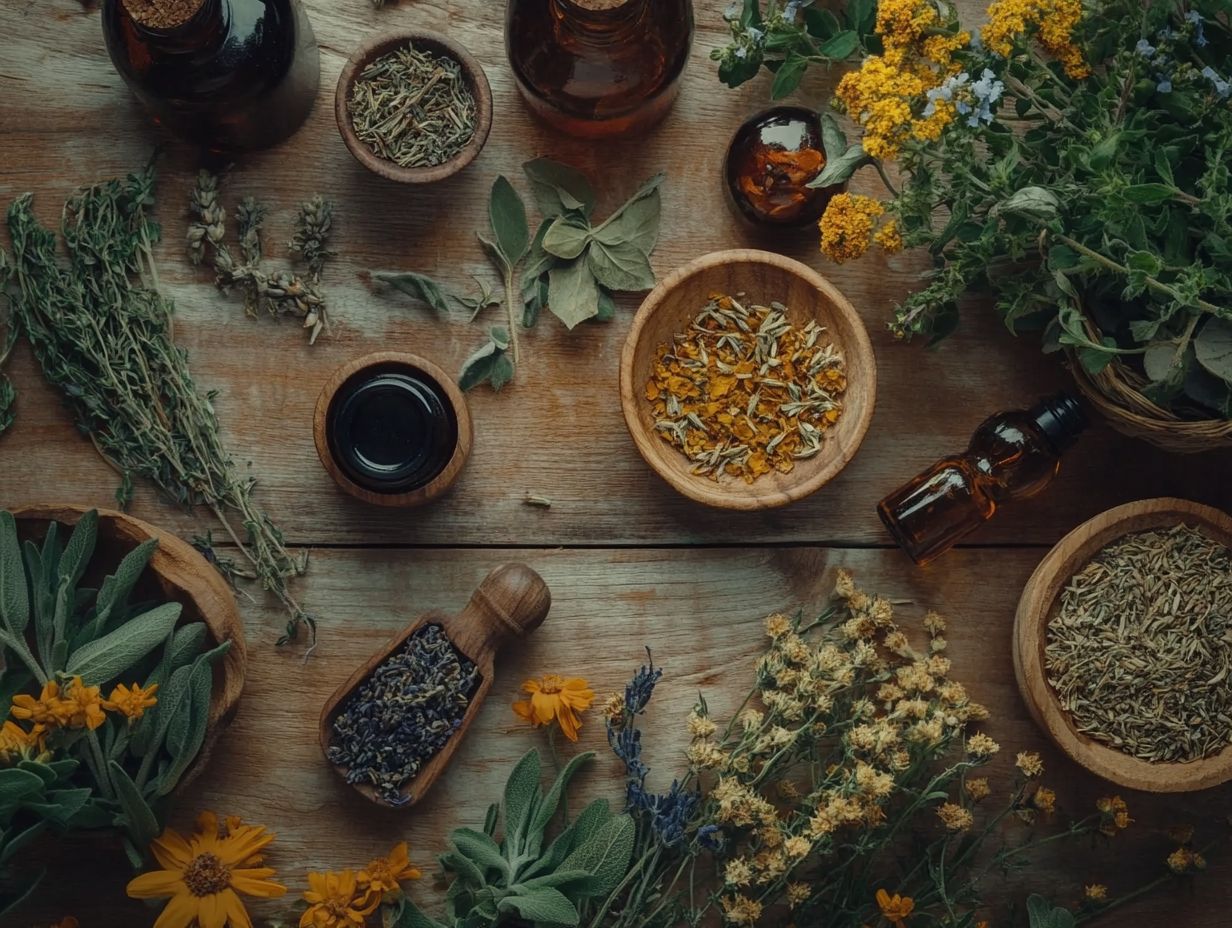
You can categorize herbal remedies into several types, such as dried herbs, concentrated liquid extracts, herbal supplements, and brewed tea.
- dried herbs
- concentrated liquid extracts
- herbal supplements
- brewed tea
Each of these forms harnesses the medicinal properties of plant sources, offering therapeutic benefits for your well-being through plant-based products.
Herbs and Plants Used for Medicinal Purposes
Many medicinal herbs, like Turmeric, Ginseng, and Garlic, are well-regarded for their therapeutic uses. They underscore the significance of plant-based products in tackling health conditions and the historical use of these remedies.
People have used these powerful herbs for centuries in different cultures. For instance, Turmeric is celebrated for its anti-inflammatory benefits. It s a go-to for managing arthritis and other inflammatory issues.
Then there s Ginseng, often your best ally for boosting energy levels and combating stress. It enhances mental clarity and vitality and is frequently mentioned in discussions about various herbal therapies.
Let s not forget Garlic, a culinary favorite and a champion for heart health and immune support.
By weaving these herbs into your daily routine, you can tap into their preventive health benefits and adopt a holistic approach to well-being, while also considering herbal supplements safety.
Supplements and Tinctures
Herbal supplements and tinctures are concentrated forms of herbal remedies. They are crafted for easy consumption, delivering potent sources of the helpful ingredients found in medicinal plants.
As you explore herbal products, you’ll find a variety of options, including capsules and powdered extracts, each with its own unique advantages. Tinctures, often extracted with alcohol, offer rapid absorption due to their liquid form and allow for easy dosage adjustments.
Capsules are a convenient, tasteless option for those who prefer to avoid liquids. Powdered extracts can be mixed into smoothies or food for versatile usage.
When choosing any supplement, it’s essential to consider third-party certification that means independent checks to ensure quality and herbal product testing. This ensures adherence to FDA regulations and confirms ingredient authenticity. Such scrutiny helps you navigate the complexities of herbal supplements and make informed choices for your well-being.
Potential Risks and Side Effects
While herbal remedies offer a wealth of health benefits, it s crucial to recognize the potential risks and side effects, as well as the importance of understanding herbal interactions.
- Potential side effects
- Herbal interactions
- Adhering to safety guidelines
Understanding herbal interactions and sticking to safety guidelines is essential for ensuring a safe and effective experience.
Interactions with Medications
Understanding herbal interactions with medications is essential for your well-being. Certain herbal interactions can lead to complications. Some herbs can alter the effectiveness of medications, raising safety concerns.
Take St. John s Wort, for example. It s notorious for reducing the effectiveness of specific antidepressants and birth control pills, leading to unintended side effects and health complications. Likewise, ginkgo biloba can interfere with blood thinners, heightening the risk of bleeding. These instances highlight the critical need for patient education, as many individuals may be unaware of the risks of mixing herbal remedies with conventional medications. It’s important to understand what should I know before using herbal remedies.
Before starting any new herbal regimen, consult your healthcare provider to discuss herbal product claims. This step makes your treatment safe and effective! Pharmacists are invaluable in this educational journey, offering insights and guidance on potential interactions.
Proper Dosage and Usage
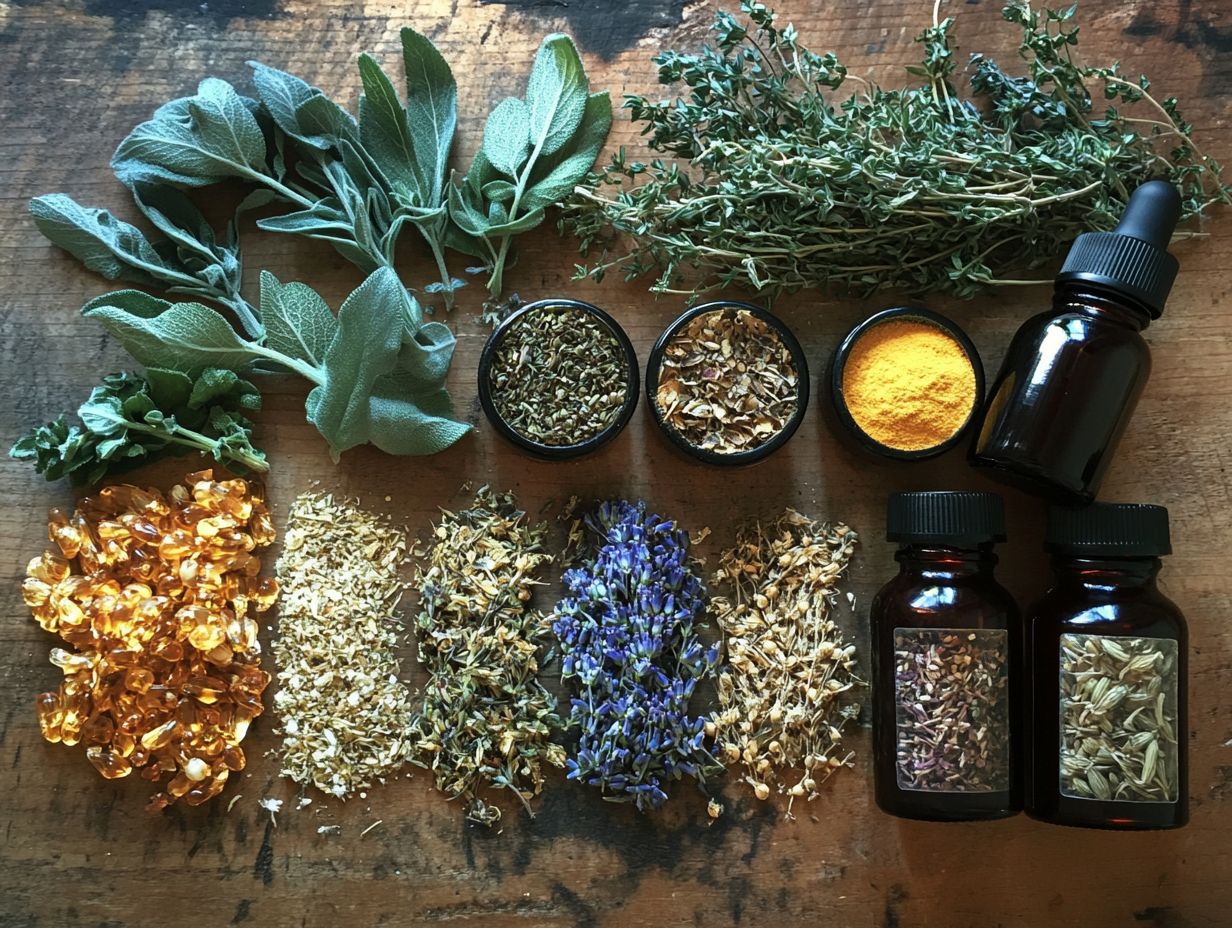
Ensuring the proper dosage and usage of herbal remedies is essential for maximizing their benefits while minimizing risks of adverse effects. Careful herbal product labeling enhances overall safety.
As you explore herbal products, pay close attention to the labeling instructions regarding dosage. Misinterpreting or neglecting these guidelines could lead to unintended consequences, undermining the benefits these remedies provide.
Opt for products with quality certification as an additional safeguard, ensuring that the herbs have been rigorously tested for potency and purity. By closely following recommended usage and monitoring any changes in your health, you ll create a more positive experience and prevent risks associated with misuse.
This vigilant approach highlights the importance of understanding how to safely and effectively incorporate herbal products into your holistic wellness regimen.
Tips for Choosing and Using Herbal Remedies
When selecting and utilizing herbal remedies, consider several key factors. Prioritize the safety of herbal supplements, seek out quality certifications, and heed recommendations from healthcare providers.
This thoughtful approach will help ensure that you achieve effective treatment and optimal results.
Research and Consultation with Healthcare Provider
Consulting with a healthcare provider before starting any herbal remedies is crucial. They can offer valuable insights into safe usage and potential interactions with your current treatments.
This guidance is vital for anyone seeking benefits from natural alternatives. Not all herbal products are created equal. Understanding how herbal remedies work is crucial, as the complexity of herbal formulations can lead to varied outcomes. Without the right knowledge, you might inadvertently expose yourself to harmful side effects or ineffective treatments.
Healthcare providers play a key role in educating you about the importance of verifying product quality through certifications. This ensures that the remedies you consider are both safe and effective. By fostering open communication, these professionals enable you to make informed choices that align with your health goals.
Frequently Asked Questions
What Are the Most Common Herbal Remedies?
The most common herbal remedies include echinacea, garlic, ginger, ginseng, peppermint, and turmeric. These remedies are often used for various health benefits.
What is Echinacea and How Does It Help with Health?
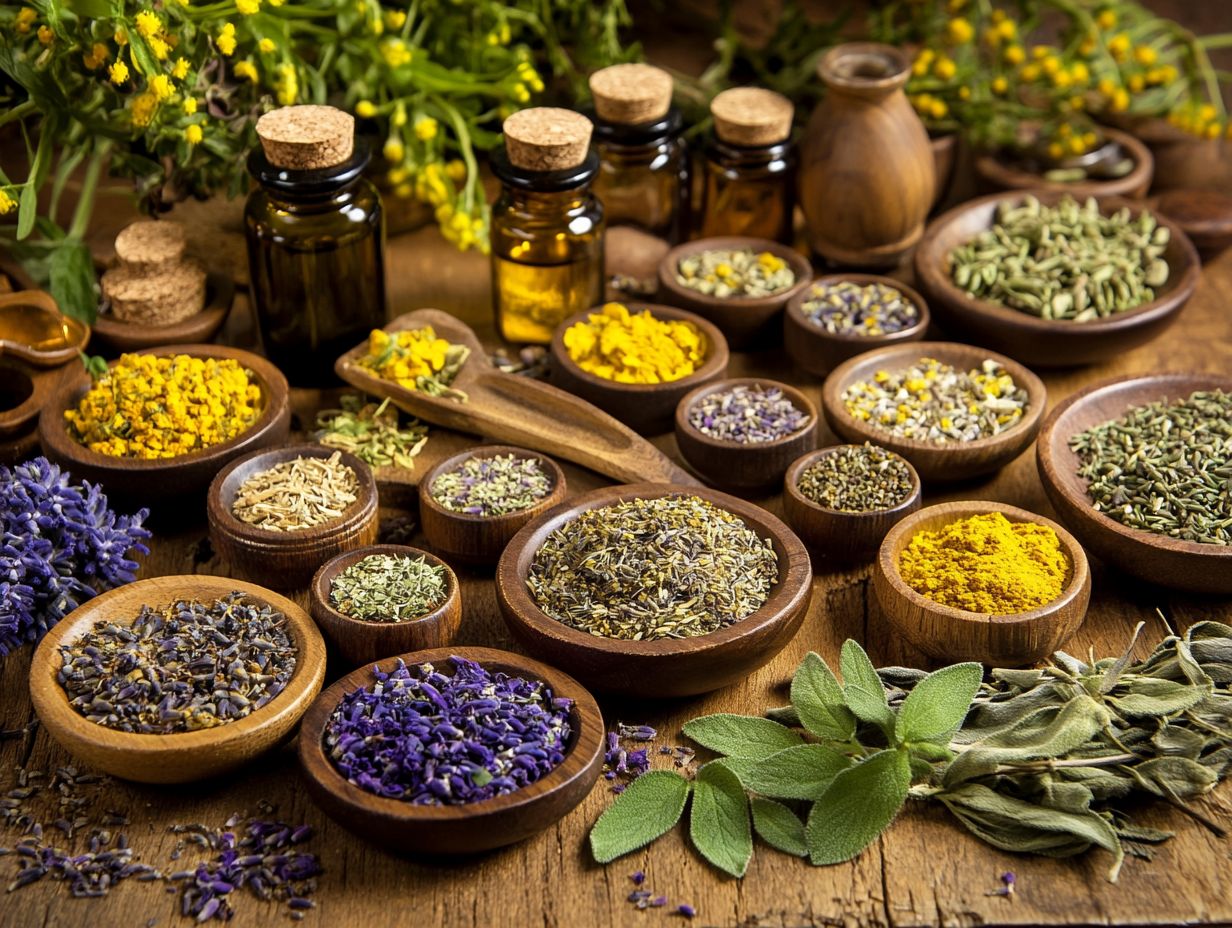
Echinacea is a flowering plant that is often used to prevent and treat colds, flu, and other respiratory infections. It is known for its immune-boosting properties.
Why is Garlic Considered a Powerful Herbal Remedy?
Garlic has been used for centuries as a natural antibiotic and immune booster. It is also known for its ability to reduce blood pressure and cholesterol levels, promoting heart health.
What Benefits Does Ginger Provide to the Body?
Ginger is a powerful anti-inflammatory! It helps ease nausea and supports digestion.
How Does Ginseng Help Improve Overall Health?
Ginseng boosts the immune system and improves mental performance. It also helps reduce stress and fatigue.
What Makes Peppermint a Popular Herbal Remedy?
Peppermint is great for digestive issues and headaches. It also helps relieve congestion.
Why is Turmeric Considered a Superfood?
Turmeric has curcumin, a compound with strong antioxidant effects. Curcumin is the active ingredient in turmeric. It s often used for arthritis, heart disease, and cancer.






